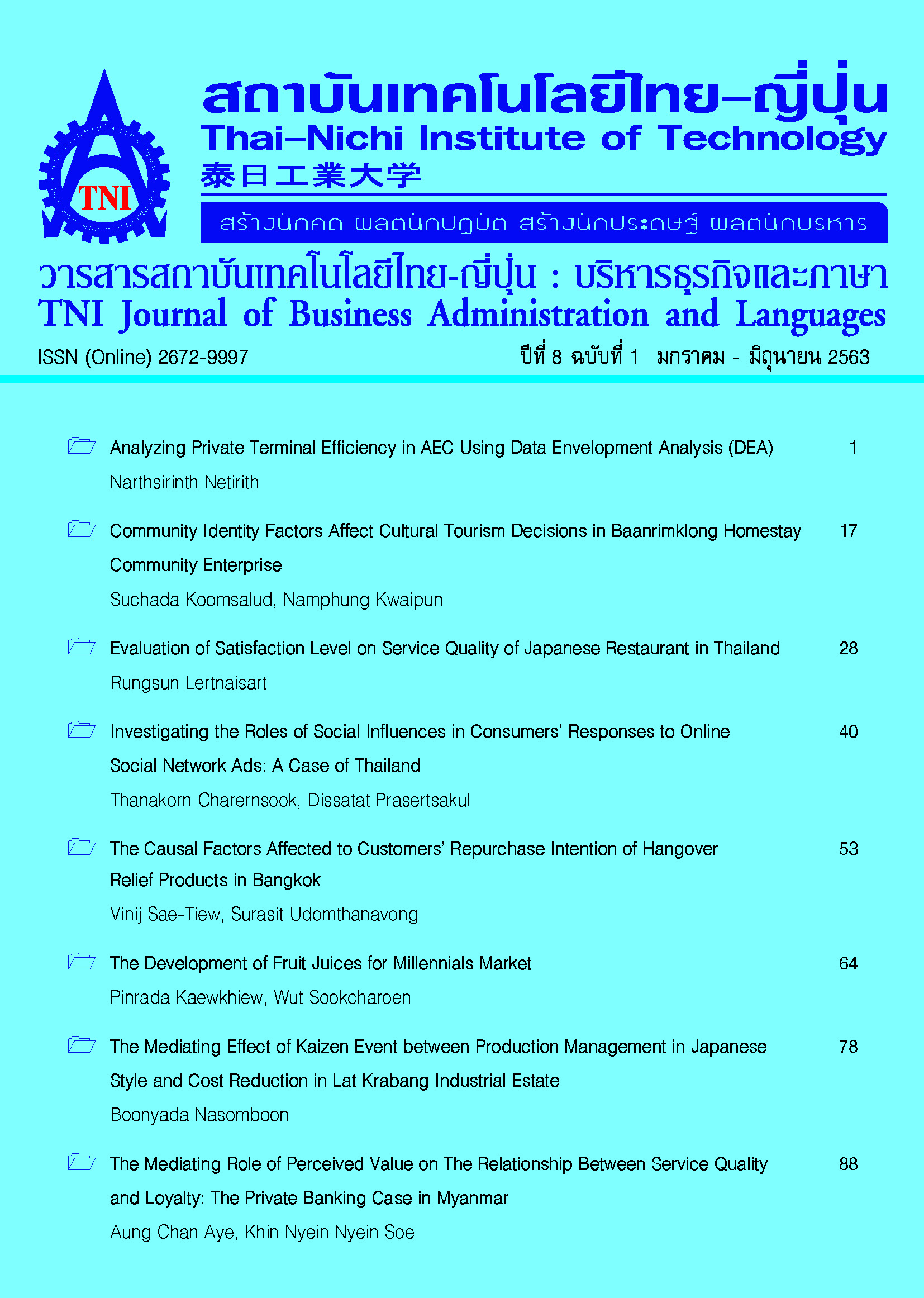The Mediating Effect of Kaizen Event between Production Management in Japanese Style and Cost Reduction in Lat Krabang Industrial Estate
Main Article Content
Abstract
This research is purposed to investigate and develop the causal structural relationship model of factors influencing Cost Reduction by analyze and compare direct and indirect effects of factors influencing Cost Reduction, consisting of 3 latent variables which are exogenous latent variable which is Production Management in Japanese Style, the endogenous latent variable is Cost Reduction, and Kaizen Event is mediator variable with the total of 14 observed variables. This research was conducted using a questionnaire as an instrument to collect data from Lat Krabang Industrial Estate 292 samples. This process was completed using the principles of structural equation modelling (SEM) which required confirmatory factor analysis on the measurement model and path analysis on the structural model.
The research result showed that the production management in Japanese style factors, which had direct influence on the cost reduction about 0.90 percent. And result showed that the kaizen factors, which had direct influence on the cost reduction about 0.63 percent. And result also showed that the production management in Japanese style factors had indirect influence on the cost reduction by passing though the mediator variable kaizen event about .81 percent.
In addition, the results of the model of the mediation variables as kaizen event factor between Japanese production management and cost reduction foundก that the model is very consistent with the empirical data.
Article Details
Article Accepting Policy
The editorial board of Thai-Nichi Institute of Technology is pleased to receive articles from lecturers and experts in the fields of business administration, languages, engineering and technology written in Thai or English. The academic work submitted for publication must not be published in any other publication before and must not be under consideration of other journal submissions. Therefore, those interested in participating in the dissemination of work and knowledge can submit their article to the editorial board for further submission to the screening committee to consider publishing in the journal. The articles that can be published include solely research articles. Interested persons can prepare their articles by reviewing recommendations for article authors.
Copyright infringement is solely the responsibility of the author(s) of the article. Articles that have been published must be screened and reviewed for quality from qualified experts approved by the editorial board.
The text that appears within each article published in this research journal is a personal opinion of each author, nothing related to Thai-Nichi Institute of Technology, and other faculty members in the institution in any way. Responsibilities and accuracy for the content of each article are owned by each author. If there is any mistake, each author will be responsible for his/her own article(s).
The editorial board reserves the right not to bring any content, views or comments of articles in the Journal of Thai-Nichi Institute of Technology to publish before receiving permission from the authorized author(s) in writing. The published work is the copyright of the Journal of Thai-Nichi Institute of Technology.
References
Aoki, K. (2008). Transferring Japanese kaizen activities to overseas plants in China. International Journal of Operation & Production Management, 28(6), 518-539.
Byrne, B. (2009). Structural equation modeling with AMOS: Basic concepts, applications, and programming (2nd ed.). New York: Taylor and Francis.
Catalina, G.L. (2016). Supplier quality management for component introduction automotive industry. Procedia Social and Behavioral Science, 221(1), 423-432.
Gordian, B. (2014). Kaizen as a strategy for improving SMEs’ performance: Assessing its acceptability and feasibility in Tanzania. European Journal of Business and Management, 6(35), 79-90.
Grazier, B. P. (1992). Kaizen Teian1: Developing systems for continuous improvement through employee suggestions. New York: Productivity Press.
Greene, B. M. (2002). A taxonomy of the adoption of lean production tools and techniques (Doctoral dissertation). University of Tennessee, Knoxville, United Stated.
Habidin, N. F., Hashim, S., Fuzi, N. M., & Salleh, M. I. (2018). Total productive maintenance, kaizen event, and performance. International Journal of Quality & Reliability Management, 35(9), 1853-1867.
Hair, J.F., Black, W.C., Babin, B.J., & Anderson, R.E. (2010). Multivariate data analysis (7th ed.). New Jersey: Pearson Education, Inc.
Imai, M. (1986). Kaizen, the key to Japan’s competitive success. United State of America: McGraw-Hill, Inc.
Kline, R.B. (2011). Principles and practice of structural equation modeling (3rd ed.). New York, NY: The Guilford Press.
Nasomboon, B., & Tuntiruttanasoontorn, B. (2018). The Japanese style of production management affecting total quality management and customer satisfaction: A case study on the best practice Organization. Journal of Global Business Review, 20(1), 13-21.
Neely, A., Mills, J., Platts, K., Richards, H., Gregory, M., Bourne, M., & Kennerley, M. (2007). Performance measurement system design: Developing and testing a process-based approach. International Journal of Operations & Production Management. 20(10), 1119-1145.
Pongwichai, S. (2013). Statistical data analysis with computer (In Thai). (24th ed.). Bangkok: Chulalongkorn University Press.
Shrafat, F.D., & Ismail, M. (2019). Structural equation modeling of lean manufacturing practices in a developing country context. Journal of Manufacturing Technology Management, 30(1), 122-145.
Suárez-Barraza, M.F., Ramis-Pujol, J., & Kerbache, L. (2011). Thoughts on kaizen and its evolution-three different perspectives and guiding principles. International Journal of Lean Six Sigma, 2(4), 288-308.
Voss, C., Tsikriktsis, N., & Frolich, M. (2002). Case research in operations management. International Journal of Operations & Production Management, 22(2), 195-219.
Womack, P.J., & Jone, T.D. (1996). Beyond Toyota: How to root out waste and pursue perfection. Harvard Business Review, 74(5), 140-158.
Worley, J.M., & Doolen, T.L. (2006). The role of communication and management support in a lean manufacturing implementation. Management Decision, 44(2), 228-245.


